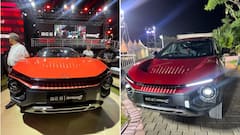Are EVs More Likely To Catch Fire Than Petrol Cars?
From the manufacturers side, the strengthening of thermal management is the key factor here but in the future several changes in the design of the battery packs could further make EVs safer.

New Delhi: A nearly brand new Nexon EV having caught fire has again ignited the debate on EV fires but till now fire incidents have been common with electric two-wheelers but not cars. At least in India, EV fires are much less but the latest incident with a car which is only two months old might raise some questions. A look at global EV fires suggests that incidents of EV fires are much less than the number of fire incidents involving ICE cars.
However, a key factor is that with EVs if it catches fire, the effect is much bigger. The battery pack is the main reason and the chemicals in one makes the fire very hard to extinguish. An EV fire is also more unpredictable. While a fuel leak is the main reason petrol/diesel car fires, in EVs thermal runaway is caused by overcharging or wrong thermal management.
While extreme heat conditions could be a reason, for the particular Nexon EV incident, the weather in Mumbai was not extreme at all. While we await to know the cause of the incident after an investigation by Tata Motors, the causes could vary.
From the manufacturers side, the strengthening of thermal management is the key factor here but in the future several changes in the design of the battery packs could further make EVs safer. The design of the battery or cell plays a huge factor in that.
In a way an EV four-wheeler is much safer than an electric two-wheeler while it is also less likely to catch fire than a regular car. Of course, EVs are still selling in small numbers in India but this is the first time that any such incident has happened with a Nexon EV, which is currently the best-selling electric car in our market.
With more EVs being sold and in demand, the solution is to make them safer by making the battery packs safer. While EVs are still new, the change in technology could mean so in the future.
A recent fire incident with an EV outside India was so severe that the car had to be submerged in water while many times the incidents occur due to crashing or overcharging while manufacturing glitches could be there too.
In the case with the Nexon EV fire, the driver escaped once he noticed smoke and if you are an EV user, it is best to charge with appropriate charging infrastructure and not over charge or even fit any aftermarket accessories or anything.
We will know the reason soon for the particular incident with the Nexon EV but the debate about EVs catching fire continues to stir all over the world.







































